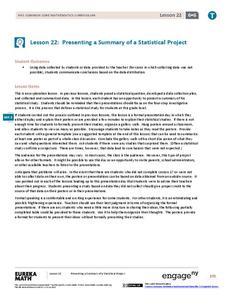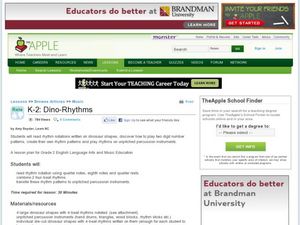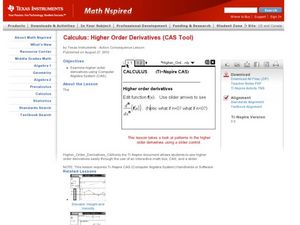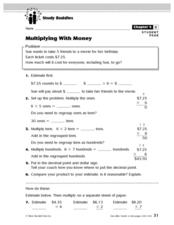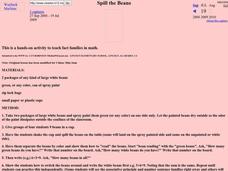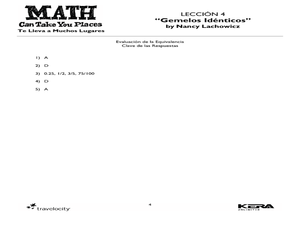Curated OER
Multiplying and Dividing Fractions with Post It Notes
Seventh graders experiment with measurement as it relates to the algorithm for dividing fractions. In this fractions lesson, 7th graders work in groups to establish how many post-it notes it takes to fill an 8 X 11 piece of paper. Using...
EngageNY
Comparison Shopping—Unit Price and Related Measurement Conversions II
Which rate is greater and by how much? Pupils continue to compare rates to solve problems in the 20th portion of a 29-part series. Rates are presented in a variety of representations either using the same representation or different...
EngageNY
Presenting a Summary of a Statistical Project
Based upon the statistics, this is what it means. The last instructional activity in a series of 22 has pupils present the findings from their statistical projects. The scholars discuss the four-step process used to complete the project...
EngageNY
Finding a Rate by Dividing Two Quantities
Develop the right station to solve rate word problems. The 18th lesson in a series of 29 starts by interpreting the aspects of rates with two different quantities. Pupils use the interpretation of rates to solve problems, and groups work...
West Contra Costa Unified School District
Law of Sines
One must obey the sine laws. A lesson introduces and derives the Law of Sines for non-right triangles. With examples that use the Law of Sines to determine unknown measures in triangles, the lesson checks to see if the Law of Sines also...
West Contra Costa Unified School District
Solving Equations Using Balance Scale, Decomposition, and Graphing
There's more than one way to solve an equation — three, actually. Scholars learn how to solve simple linear equations in one variable using three different methods, which include using balance scales, using decomposition (e.g., turning...
West Contra Costa Unified School District
Law of Sines
Laws are meant to be broken, right? Learners derive the Law of Sines by dropping a perpendicular from one vertex to its opposite side. Using the Law of Sines, mathematicians solve for various parts of triangles.
Alabama Learning Exchange
Binomial Expansion—Shortcut Please
There has got to be a better way; you just have to find it! Given a general binomial to expand with increasing powers, pupils realize that there must be a better way than multiple multiplications. Classmates look for patterns and use...
Curated OER
K-2: Dino-Rhythms
Second graders read rhythm notation and combine four-beat rhythms. In this rhythms lesson, 2nd graders read quarter notes, eighth notes, and quarter rests in rhythms that are written on dinosaur shapes. They clap, snap, or stamp out the...
Curated OER
Concept: Square Root
In this square root worksheet, students solve problems with exponents. They find the square root of given numbers. Students ill in missing numbers on a radical clock face. This eleven-page worksheet contains notes, detailed instructions...
Curated OER
Higher Order Derivatives
Learn how to solve problems by taking the derivative. Then, through examination of higher order derivatives using the CAS computer program, students create a visual of what is happening with the equation.
Curated OER
Study Buddies: Multiplying With Money
In this math homework worksheet, students will solve a money multiplication problem with the support of a "Coach". Students will follow a step-by-step process and notes are provided for the coach.
Curated OER
Spill the Beans
Learners explore the meaning of a fact family. In this Math lesson, students work in small groups to create their own fact family based on color of beans. The beans are colored and represent a given value. Learners discover the meaning...
Curated OER
How Tall is that Tree?
Students apply their math skills to develop an accurate estimate of the height of a tall tree. Three different methods are outlined. All grade levels should be able to perform the shadow method and the proportional method.
Curated OER
Creating AB Patterns
Students work with patterns. In this pattern lesson, students find AB patterns in nature and the manmade world. They create their own AB pattern using math manipulatives and visual arts.
Curated OER
Springbreak Trip
Twelfth graders plan and calculate the cost of taking a specific Spring Break trip, with a certain budget and given set costs. they determine miles traveled, gas costs, hotel expenses, etc.
Curated OER
How Do Things Fall?
Students study forces by examining the force of gravitational attraction. They observe how objects fall and measure the force of gravitational attraction upon objects. Students discover that, since gravitational constants are different...
Curated OER
Something Fishy (Statistics)
Learners are introduced to a problem involving an environmental issue. They are introduced to the capture-recapture method which involves capturing fish, tagging them, returning them and recapturing another sample. Pupils work in...
Curated OER
Stories That Really Add Up
Students, in groups, develop math lessons for younger students that each stems from a popular student story. Group members individually develop lessons for other subject areas based on their group's story, creating interdisciplinary units.
Curated OER
Topos, Compasses, and Triangles, Oh My!
Students triangulate using a compass, topographical (topo) map and a view of outside landmarks. They take a field trip to another location away from school and mark discernible landmarks (like mountains or radio towers) and changes in...
Curated OER
Identical Twins
Sixth graders work with equivalent fractions, decimals, and percents. In this equivalency lesson, 6th graders participate in a number of activities aimed at increasing their understanding of equivalent expressions. They form a human...
Curated OER
Million Dollar Project
Students calculate how they will spend a million dollars. In this millionaire math lesson, students complete a worksheet and then make a poster of how they would spend a million dollars. Each item and its cost must be shown. a minimum...
Curated OER
Special Effects-Titanic and Beyond
Students view a video clip about special effects. They use geometry to determine how it changes one's perspective. They work together to construct their own room and comparing their room with other groups, noting the type of...
Curated OER
What's the Matter with My Snow?
Students collect snow samples around their school. They explore the concepts of density and phase change as well as the math skills of measurement and statistics. Students explore the water cycle through an interactive, down loadable...




